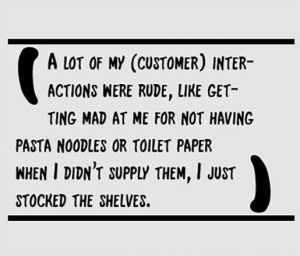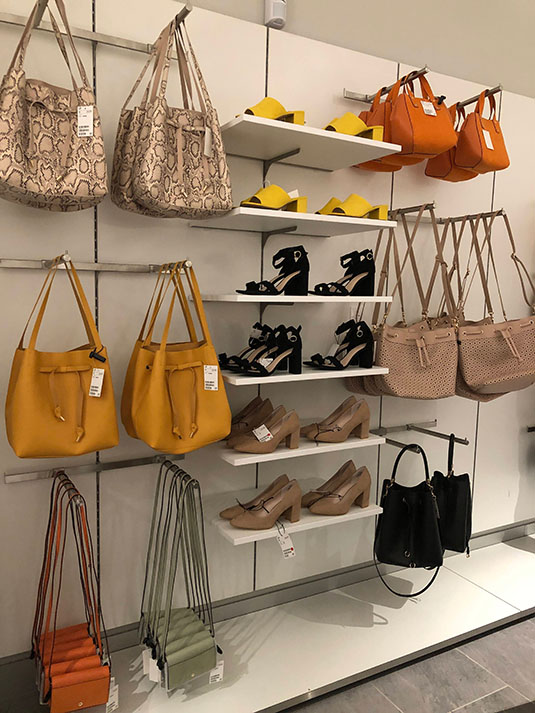There’s an idea prominent in the business world that proclaims “the customer is always right.” This overused company framework has led to a toxic sense of entitlement and a need for instant gratification among consumers, which in turn, has made working in customer service a dreaded job among many.
 Ratna Rani Das works at the Dhanmondi branch of retail super shop chain Meena Bazar in Dhaka, Bangladesh. She is working during COVID-19 and considers her work to be an essential service to help customers during the pandemic. Photo and caption courtesy of UN Women/Fahad Abdullah Kaizer
Ratna Rani Das works at the Dhanmondi branch of retail super shop chain Meena Bazar in Dhaka, Bangladesh. She is working during COVID-19 and considers her work to be an essential service to help customers during the pandemic. Photo and caption courtesy of UN Women/Fahad Abdullah Kaizer
__________________________________________________
As someone who has been in customer service ever since my very first hostess job in 2015, I have quite the expansive list of customer service horror stories to which I’m sure many fellow retail workers and servers can relate. The two longest jobs I’ve held in my five years of working have been with two extremely impactful, global companies: Nike and H&M. I spent a year and four months as a sales associate at Nike, getting promoted to a stockroom lead after about six months of being in the store, and I’ve spent two years now at H&M, which is one of the two jobs that I currently hold today. At the moment, I also work for the recent essential-business powerhouse, Target, a job which I started back in April right in the heart of the COVID-19 pandemic due to H&M and a previous serving job I held at Harpo’s in Chesterfield both being shut down. You would think shoppers would be nicer and more sympathetic toward essential workers during a global pandemic, but think again because the amount of passive-aggressive comments and mini-tantrums I’ve gotten from customers since the pandemic began has actually been laughable. What I find to be even more interesting about this is that most of the time, these comical overreactions actually are coming from middle- to older-aged men and women as opposed to the younger, less-experienced-in-life crowd. Again, you might expect it to be the other way around, since the older customers technically are supposed to be more wise and mature. However, the younger generations that come in and shop at my (and many other) stores actually exude tolerance and understanding. Now before you start feeling attacked or think that I’m generalizing when I say these sorts of things, ask yourself: Was I understanding and pleasant the last time a cashier or server told me something I didn’t like hearing? In terms of my current and past workplaces, many of my co-workers often agree when I have brought up this point, and share their own experiences to validate my opinion on this issue. For example, someone who worked at a place I never have: Walmart. Sophomore health science major and MBU soccer player Maddie Mrazik spent some of the earliest days of the coronavirus pandemic waking up early and working shifts that were spent purely stocking shelves at a Walmart located in St. Peters, Missouri. “I worked at Walmart during a crazy time, which was the peak of the pandemic when everyone was going out and buying everything off the shelves,” Mrazik said in an interview via text message. “A lot of my (customer) interactions were rude, like getting mad at me for not having pasta noodles or toilet paper when I didn’t supply them, I just stocked the shelves.” “I would say the customers’ attitudes and demeanors really depend on the location,” Mrazik said. “At my serving job, it’s a lot of wealthy (country club) members, so they expect to get what they want and more. If you can meet their needs, it’s super easy to get along with them. … Overall, I think it really depends on how you handle their requests.” Speaking of serving, that’s a world of its own, which I personally found to be true in just a few short months serving at Harpo’s, a sports bar located in Chesterfield, Missouri, back in the beginning of 2020. New to MBU, freshman soccer player and current food industry employee Saige Stowers has been working as a phone girl at Cecil Whitaker’s Pizzeria for just four months, which has proven to be plenty of time for a wide variety of customer interactions. “One challenge I run into at my job is not being able to make every customer happy,” Stowers said. “On busy days, sometimes people are sitting on hold for awhile and they tend to get extremely mad about that. Customers also tend to call me and complain about their food being messed up, and I have to deal with that almost every single time I work.” Now, the real question here is: Why is this happening? Why is this the case. Well, it actually starts from within these companies that are employing us. Although it might not necessarily be an official written rule in a company’s customer service policy handbook, more often than not, if a customer is raising hell about something minuscule, the manager will get involved and end up apologizing to that customer, coddling them and sometimes even just completely disregarding their employee and giving into the customers’ complaints by giving them what they want. As seen in the bestselling book of Hal Rosenbluth, co-founder of Take Care Health Systems and Clinics, titled, “The Customer Comes Second,” by putting the customers’ needs in front of their own employees’ needs, managers will actually see WORSE morale from their staff as a whole. It may seem like the right thing to do in the spirit of capitalism and all, but that type of behavior from management really does make customer service jobs less and less appealing. It also spawns a sense of entitlement from the consumers who have seen their tantrums get them results. So, the next time you’re in a store, restaurant, gym, or even if you’re on the phone with a customer service representative, think a little bit more deeply before blowing up at a minor inconvenience. Just because you, your parents or society have told you that the customer is always right does not mean that that is right.
 Mrazik is now a server at Old Hickory Golf Club in St. Peters, Missouri, a place she’s been employed since 2019 that was temporarily closed as well due to COVID-19 restrictions.
Mrazik is now a server at Old Hickory Golf Club in St. Peters, Missouri, a place she’s been employed since 2019 that was temporarily closed as well due to COVID-19 restrictions. 